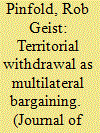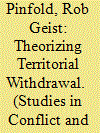| Srl | Item |
| 1 |
ID:
177994


|
|
|
|
|
| Summary/Abstract |
This essay tests competing scholarly approaches to territorial withdrawal in two cases seldom scrutinised by theorists: the Israeli exits from the Gaza Strip and southern Lebanon. The dominant framing of these cases as ‘unilateral’ suggests Israel withdrew without bargaining with actors in the international system. These cases therefore apparently illustrate the primacy of domestic politics in facilitating or precluding withdrawal. Yet, this essay delineates often-overlooked causal paths emanating from: (1) violent Israeli bargaining with the enemy and (2) diplomatic Israeli bargaining with third parties. Hence, this essay demonstrates withdrawal is dependent on bargaining with external actors, even in ‘unilateral’ cases.
|
|
|
|
|
|
|
|
|
|
|
|
|
|
|
|
| 2 |
ID:
188006


|
|
|
|
|
| Summary/Abstract |
This article examines what factors cause states to withdraw from foreign territorial interventions. Scholarly analyses of withdrawal are rare, whilst within the broader research area of territorial conflict, studies are often dichotomized into neorealist or constructivist-inspired works, emphasizing a select few variables and one level of analysis alone. We argue these excessive simplifications of international politics lack utility for understanding territorial withdrawal. Instead, we employ the principles of strategic theory informed by a Clausewitzian paradigm, and construct a framework of three “arenas of bargaining,” spanning multiple variable-types and levels of analysis, to explain territorial withdrawal. In so doing, the analysis delineates a comprehensible and novel theoretical framework for understanding an under-researched policy problem.
|
|
|
|
|
|
|
|
|
|
|
|
|
|
|
|